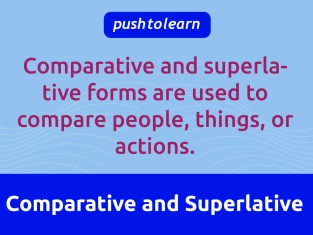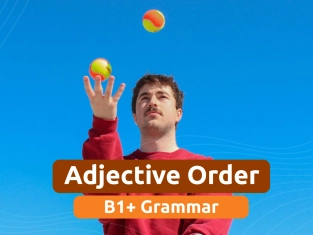by PushtoLearn
Intensifiers
Table of Contents
Intensifiers Exercises
These exercises focus on Intensifiers
What Are Intensifiers?
Intensifiers are words used to make adjectives stronger. Instead of just saying interesting, you can say very interesting to add emphasis. These words help express emotions more strongly and make descriptions more vivid.
Common intensifiers include:
-
very → It’s a very exciting story.
-
really → She is really happy today.
-
extremely → The test was extremely difficult.
Using intensifiers correctly makes your English more natural and expressive.

Common Intensifiers and Their Usage
Here are some intensifiers and how they strengthen adjectives:
|
Intensifier |
Example Sentence |
|
amazingly |
She is amazingly talented. |
|
exceptionally |
He is exceptionally smart. |
|
incredibly |
The view was incredibly beautiful. |
|
particularly |
That joke was particularly funny. |
|
remarkably |
She was remarkably calm during the test. |
|
unusually |
It’s unusually cold today. |
Using "Enough" as an Intensifier
"Enough" is different from other intensifiers because it comes after the adjective:
✅ He is old enough to drive.
✅ These shoes aren’t big enough for me.
🚫 He is enough old to drive. (Incorrect!)
Intensifiers with Strong Adjectives
Some adjectives already have a strong meaning. For example, instead of very big, we use enormous. Instead of very small, we say tiny.
Here are some examples of normal adjectives and their strong forms:
|
Normal Adjective |
Strong Adjective |
|
very big |
enormous, huge |
|
very small |
tiny |
|
very clever |
brilliant |
|
very bad |
awful, terrible, dreadful |
|
very sure |
certain |
|
very good |
excellent, perfect |
|
very tasty |
delicious |
We do not use "very" with strong adjectives:
🚫 The food was very delicious. (Incorrect!)
✅ The food was absolutely delicious. (Correct!)
Common Intensifiers for Strong Adjectives
With strong adjectives, we use intensifiers like:
-
absolutely → The hotel was absolutely perfect.
-
completely → I was completely exhausted after the trip.
-
exceptionally → She is exceptionally brilliant.
-
utterly → The weather was utterly dreadful.
Intensifiers with Particular Adjectives
Some intensifiers only go with certain adjectives:
|
Intensifier |
Adjectives Used With |
Example |
|
dangerously |
ill, hot |
He is dangerously ill. |
|
seriously |
damaged, hurt |
The car was seriously damaged. |
|
highly |
successful, intelligent, likely |
She is highly intelligent. |
|
bitterly |
disappointed, unhappy, cold |
I was bitterly disappointed. |
🚫 Incorrect: We had a highly tasty meal.
✅ Correct: We had a very tasty meal.
🚫 Incorrect: It was bitterly good.
✅ Correct: It was really good.
You should check a dictionary to see which intensifiers match which adjectives.
Intensifiers with Comparatives and Superlatives
We use different intensifiers with comparative and superlative adjectives:
Intensifiers with Comparatives
|
Intensifier |
Example |
|
much |
He is much taller than me. |
|
far |
This book is far better than that one. |
|
a lot |
New York is a lot bigger than Boston. |
|
a great deal |
The second movie was a great deal more interesting. |
🚫 Incorrect: He is very older than me.
✅ Correct: He is much older than me.
Intensifiers with Superlatives
|
Intensifier |
Example |
|
easily |
This is easily the best movie I’ve seen. |
|
by far |
She was by far the most talented singer. |
🚫 Incorrect: This is very the best book.
✅ Correct: This is by far the best book.
Adjectives as Intensifiers
Some adjectives can act as intensifiers when used with nouns:
|
Adjective |
Example |
|
absolute |
That’s an absolute disaster. |
|
complete |
He’s a complete idiot. |
|
total |
That was a total failure. |
|
perfect |
It’s a perfect opportunity. |
|
utter |
They were talking utter nonsense. |
🚫 Incorrect: The idiot was complete.
✅ Correct: He’s a complete idiot.
🚫 Incorrect: The nonsense was utter.
✅ Correct: They were talking utter nonsense.
Common Mistakes with Intensifiers
|
Mistake |
Correction |
|
He is enough tall to play basketball. |
He is tall enough to play basketball. |
|
She is very exhausted. |
She is absolutely exhausted. |
|
This is very the best option. |
This is by far the best option. |
|
He was bitterly happy. |
He was really happy. |
FAQs About Intensifiers
What is an intensifier?
An intensifier is a word that makes an adjective stronger, like very, really, or extremely.
Can I use "very" with strong adjectives?
No, you should use words like absolutely or completely instead. For example, say absolutely amazing instead of very amazing.
What’s the difference between "too" and "enough"?
-
Too means more than necessary (negative): The coffee is too hot to drink.
-
Enough means the right amount (positive): The coffee is hot enough to enjoy.
What intensifiers are used with comparatives?
Words like much, far, a lot, and a great deal strengthen comparatives. Example: He is much faster than me.
What are some common mistakes with intensifiers?
Some common mistakes include using very with strong adjectives (very excellent ❌) and placing enough before an adjective (enough big ❌).

